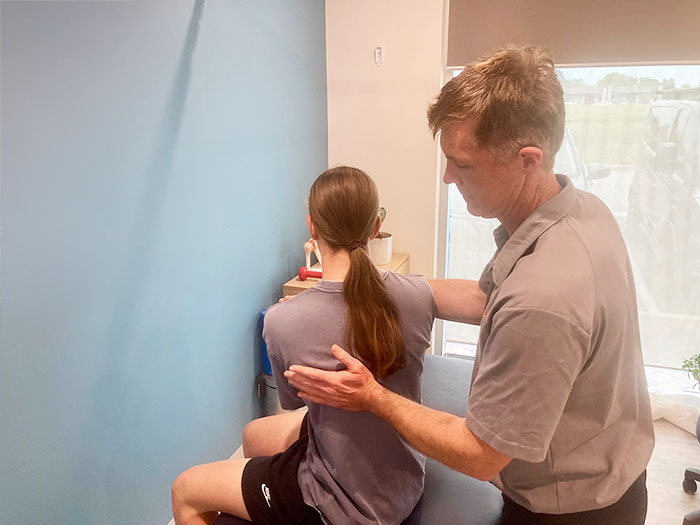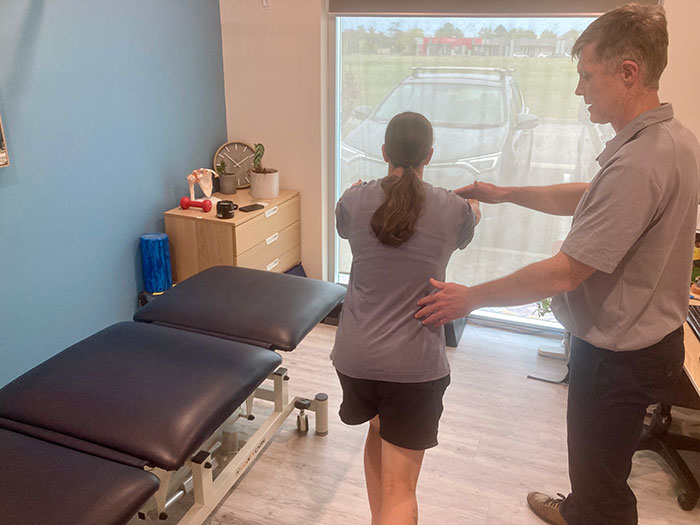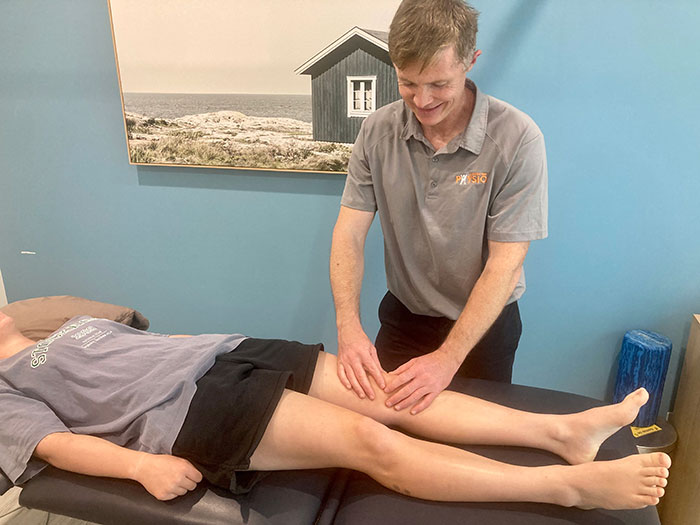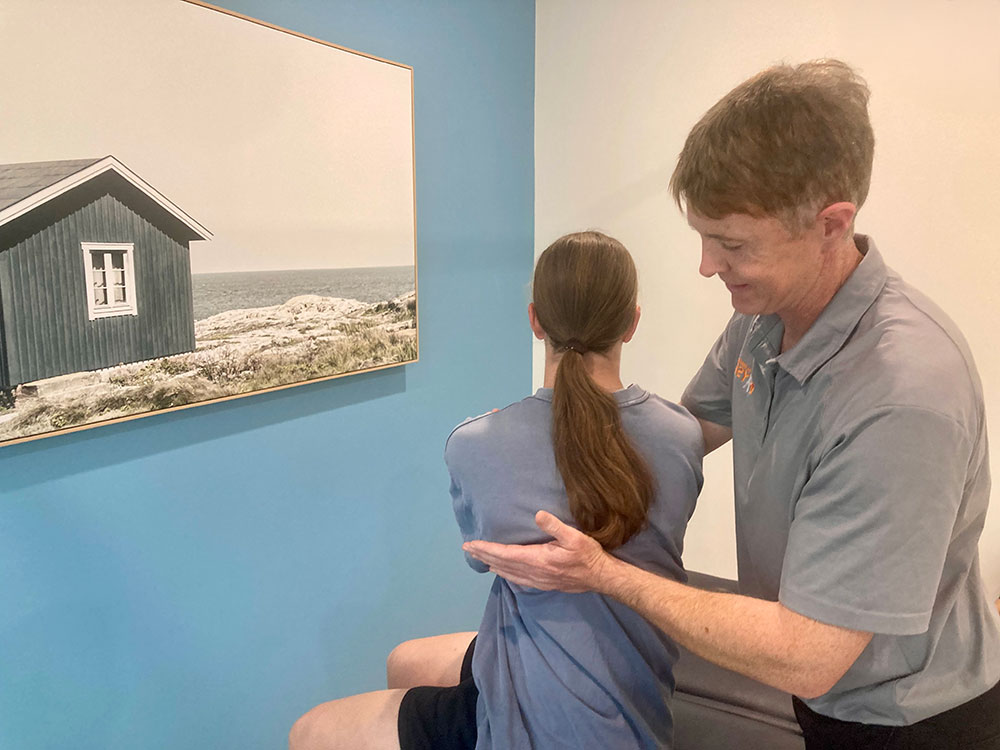Aldinga Bay Physio supports health and movement across the Aldinga community
Aldinga Bay Physiotherapy provides assessment and treatment services for residents across Aldinga, including Aldinga Beach, Port Willunga, Maslin Beach, Willunga, McLaren Vale and other nearby suburbs across the Fleurieu Peninsula. The clinic is owned and led by physiotherapist Anthony Sheridan, BSc MAPA, who is a member of the Australian Physiotherapy Association and registered with the Australian Health Practitioner Regulation Agency (AHPRA).
As your local Aldinga physio, we are here to make quality care accessible, with convenient appointments and trusted, evidence-based treatment. Call us on 04049 3815 673 or book your appointment online.

How seeing a physiotherapist makes a difference?
Many people want to understand what a physiotherapist does before booking. I take time to understand what daily life looks like for you, then match care to your goals so the plan feels achievable between visits.
This page explains the essentials about physiotherapy, including training and registration, the kinds of problems we treat, the treatments we use and what happens at a first visit. Physiotherapy brings together experience, hands on care, education and exercise to improve movement and reduce pain.
The sections below answer common questions so you can decide with confidence.
What does a physiotherapist do?
Physiotherapists are university-trained health professionals who assess, diagnose and treat pain, injury and movement problems. They use evidence-based techniques to improve function, reduce pain and support long-term recovery. Treatment may include hands-on therapy, education and specific exercise programs designed to restore confidence in movement.
Physiotherapy education and qualifications
Areas of physiotherapy practice
Physiotherapists also assist people with chronic disease, mobility challenges and post-operative rehabilitation.
Assessment and treatment approach
AHPRA registration
Why seeing a qualified physiotherapist matters
Professional registration provides important protections for people seeking physiotherapy services. AHPRA registration requires practitioners to meet specific educational standards, maintain professional indemnity insurance, and comply with mandatory reporting obligations. Registered physiotherapists are held accountable to national standards and can face disciplinary action if they practice outside their scope or breach professional conduct requirements.
Qualifications and postgraduate study
Qualification levels vary within the physiotherapy profession. Entry-level physiotherapists complete a four-year bachelor’s degree. Many practitioners pursue additional postgraduate qualifications, including graduate certificates, master’s degrees or specialist certifications through the Australian College of Physiotherapists. These advanced qualifications represent additional study in specific areas such as sports physiotherapy, musculoskeletal physiotherapy, or neurological rehabilitation.
Clinical experience and specialisation
Clinical experience shapes a physiotherapist’s ability to assess complex presentations and adapt management approaches. Practitioners who work in specific areas over time develop pattern-recognition and reasoning skills from diverse cases. When selecting a physiotherapist, consider their experience with presentations similar to yours, especially for complex or chronic conditions.
Professional membership and ongoing learning
Professional membership and ongoing learning
I am AHPRA registered and an Australian Physiotherapy Association (APA) member. APA membership matters to me because it connects my practice with education, clinical guidelines and supportive peer networks. I complete continuing professional development each year so care stays aligned with current research and best practice. Being part of APA groups helps me discuss complex cases and refine how I assess, treat and support your recovery.
Registered versus unregistered providers
Only practitioners with current AHPRA registration can legally use the title “physiotherapist” or “physical therapist” in Australia. Other providers may offer manual therapy or movement services but have not completed physiotherapy qualifications or met registration requirements.



Research-backed care
Evidence-based practice in physiotherapy
1
Research and clinical reasoning
Evidence-based practice integrates current research, clinical expertise and patient preferences. Physiotherapists rely on studies published in peer-reviewed journals, clinical guidelines and professional consensus to guide assessment and treatment.
Resources such as the Physiotherapy Evidence Database (PEDro), support decision-making by providing access to high-quality clinical trials and systematic reviews. Clinical reasoning combines this evidence with the physiotherapist’s judgment and experience to design safe, effective programs for each individual.
2
Pain science and education
Pain research has reshaped how physiotherapists understand persistent pain and recovery. Explaining the nature of pain helps patients interpret symptoms more accurately, reduces fear, and builds confidence in movement. Education is a central part of treatment, allowing people to manage flare-ups and take an active role in recovery.
Evidence-based practice does not mean applying research findings rigidly. Clinical reasoning involves interpreting research in the context of individual presentations. A person’s age, comorbidities, prior injury history, activity goals, and response to previous treatments all influence management decisions. Experienced physiotherapists integrate research evidence, assessment findings, and patient preferences to develop appropriate management plans. Many people tell me that a clear explanation of their pain is the moment things start to make sense and feel less frightening.
Ongoing support and collaborative care
Follow up and progress
Physiotherapy often involves several appointments over weeks or months, depending on the condition. Early sessions focus on assessment and baseline measures, and later visits review progress, adjust the plan and remove barriers to recovery.
Communication and shared decisions
The relationship between the physiotherapist and patient influences engagement with management approaches. You will always know what we are trying, why we are trying it and how we will measure progress together. Effective communication, shared decision making and clear explanation of assessment findings contribute to this relationship. Physiotherapists who involve people in treatment decisions and respect individual preferences tend to see better adherence to exercise programs and self-management strategies.
Working with your healthcare team
Many presentations benefit from input across multiple health disciplines. Physiotherapists work alongside general practitioners, specialists, occupational therapists, exercise physiologists, psychologists and other health professionals. This collaborative approach recognises that complex presentations often require expertise from multiple disciplines. Your physiotherapist may communicate with other providers, with your consent, to ensure coordinated care. When it helps, I will liaise with your GP or specialist, so everyone is working from the same plan.
Self-management and education
Measuring outcomes and adapting care
Progress monitoring helps determine whether management approaches are practical. Physiotherapists use various outcome measures, functional tests and patient-reported measures to track changes over time. If progress stalls or symptoms worsen, reassessment and adjustment of management strategies occur. This responsive approach ensures treatment remains appropriate as conditions change or people move through different phases of recovery.
Common conditions physiotherapy can help
Care is practical and to the point, with treatment that fits real life at home, work and sport. Physiotherapy supports recovery and prevention for many pain and movement problems. Our physiotherapy services cover a wide range of treatments and conditions, including:
- Back pain
- Sciatica
- Neck pain
- Sports injuries
- Headaches and migraine
- Hip and knee arthritis
- Tendonitis/tendinopathies
- Shoulder pain/injury
- Post-op rehab
- Dry needling
- Kids and the younger athlete
- NDIS

How physiotherapy supports long-term health

Building movement confidence
Physiotherapy supports lasting health by teaching safe movement and building physical capacity. Understanding how the body responds to load, stress and activity helps people make better choices in exercise, work and daily life. This education reduces injury risk and helps maintain strength and mobility across the lifespan.

Staying active with age
Physical capacity declines naturally with aging, but the rate of decline varies significantly based on activity levels and movement patterns. Regular physical activity, appropriate strength training and maintenance of movement quality can slow age-related decline in muscle mass, bone density, balance and cardiovascular fitness. Physiotherapists provide guidance on appropriate exercise types, intensity levels and progression strategies that match individual capacity and goals.

Managing chronic conditions
Physiotherapy plays an important role in chronic disease managementChronic disease management represents an important area of physiotherapy practice. Conditions such as diabetes, heart disease, arthritis and COPD benefit from appropriate exercise and movement strategies. Plans are tailored to individual symptoms and limitations, supporting sustainable improvement in health and quality of life.

Preventing future injury
Movement screening and biomechanical assessment can identify factors that may contribute to future injury risk. Early detection allows preventive strategies before symptoms develop.

Physiotherapy and public health
Physiotherapy also benefits community health by promoting physical activity, educating about movement and independence, and reducing long-term disability. Research recognises the role of physiotherapy in preventing disability and supporting healthy ageing.
Accessing physiotherapy services in Aldinga
You don’t need a referral to see a physiotherapist at Aldinga Bay Physio; appointments can be booked directly online or by phone. If your condition involves sudden severe pain, unexplained symptoms or a possible fracture, your GP may recommend imaging or specialist review alongside physiotherapy. We regularly work with local GPs and specialists to make this process simple for you.
Most private health insurance policies with extras cover include a physiotherapy rebate. We offer HICAPS on-the-spot claims at the clinic, so you only pay the gap amount. Coverage and rebate amounts vary between funds, so it’s worth checking with your insurer before your first visit. If you are unsure about eligibility or paperwork, we can explain what to bring when you book.
Medicare rebates for physiotherapy are available under specific circumstances. The Chronic Disease Management program allows eligible patients to access up to five allied health visits per calendar year with a GP management plan and referral.
We also accept DVA cardholders, ReturnToWorkSA, and NDIS self-managed or plan-managed participants. If you’re unsure about eligibility, our reception team can explain how rebates work and what paperwork to bring.
Finding the right physiotherapist for your needs
Choosing a physiotherapist is about more than just location. Experience, communication style and treatment approach all influence how comfortable and confident you feel during recovery. It helps to ask about a practitioner’s background, preferred methods and the time they allow for one-on-one care. Local clinics like Aldinga Bay Physio make this easier by offering clear information, convenient access and continuity with the same practitioner each visit.
Finding the right physiotherapist for your needs
Choosing a physiotherapist is about more than just location. Experience, communication style and treatment approach all influence how comfortable and confident you feel during recovery. It helps to ask about a practitioner’s background, preferred methods and the time they allow for one-on-one care. Local clinics like Aldinga Bay Physio make this easier by offering clear information, convenient access and continuity with the same practitioner each visit.
What you can expect from Aldinga Bay Physio
Appointments are easy to arrange with good availability during the week, and the clinic is located along side Aldinga Shopping Centre with free parking and level access for people with mobility needs. The facility and treatment rooms are quiet and comfortable, with space to test movements and practice your home program before you go.
From your first consultation, you can expect a professional and personal approach. You’ll have time to explain your concerns, receive clear feedback from your physiotherapist, and be involved in planning your treatment. Each session builds on your goals, so progress feels steady and transparent.
Why choose us
Why choose Aldinga Bay Physio

Registered and recognised
AHPRA-registered and an active member of the Australian Physiotherapy Association, ensuring care meets national standards.

Time and attention

Clear guidance and practical plans

Community connection

Your local physiotherapist
Your local Aldinga physiotherapist
Every appointment is provided by Anthony Sheridan, BSc MAPA, an experienced physiotherapist with more than 18 years in practice across Ireland, the UK and Australia. I enjoy helping people get back to everyday things, from school sport and weekend gardening to long walks on the coast. Having worked in paediatric physiotherapy and with youth sports teams, I understand growing bodies and how school and sport shape recovery.
With a focus on manual therapy, exercise rehabilitation and education the aim is to support recovery and long-term wellbeing.

